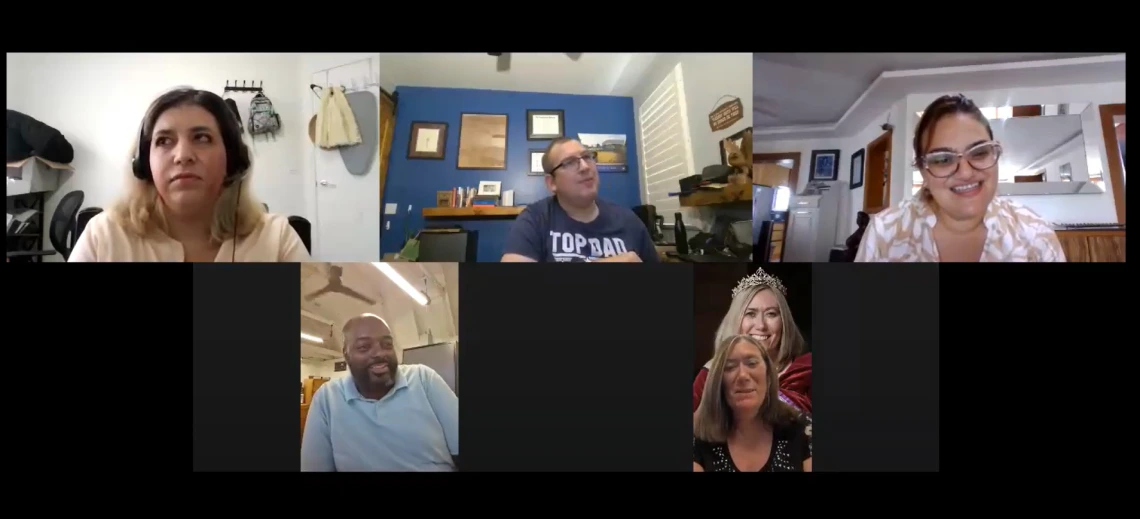Our Parenting Journeys: Pregnancy and Parenting Panel Recap

By Drew Milne
On Wednesday, July 30, the Sonoran Center hosted “Our Parenting Journeys”, a panel of parents to discuss the intersection of disability and parenting; its challenges, its rewards, and the experiences of both children and parents with disabilities. The discussion was part of the Sonoran Center’s broader Pregnancy and Parenting project, an initiative dedicated to providing guidance and resources to people with disabilities who are or who want to become parents. The panel - Jacqueline Cuevas, Jason Snead, Ashleigh Moon, Mark Taylor, and moderator Sharon Malone - represented a diverse cross-section of the disability parenting community. Jacqueline Cueva is a mother of three from Detroit, Michigan, who has a functional neurological disorder. Jason Snead, from Phoenix AZ, is a father of two boys aged seven and three, and he has Cerebral Palsy. Ashleigh Moon, who is blind, is a mother of two. She is also the wife of Jordan Moon, who was previously interviewed for his own featured article in the Pregnancy and Parenting Project. Mark Taylor is a father of a 10 year old with Down Syndrome and Autism. Sharon Malone, who moderated the panel discussion, is a mother of three and a T5 complete paraplegic.
The conversation touched on a variety of topics, including finding community among parents with disabilities, getting resources to people who need them, accommodations that healthcare providers can implement, and more.
One highlight was when the panelists shared their biggest challenges when becoming a parent, and how they overcame them. Some were specific to their disabilities, while others were challenges that every new parent goes through.
“One of the biggest challenges was trying to find the right resources,” Jason said. “I have limited use of my right hand. So, I was trying to find a way to carry my son when he was born because I knew eventually I would have to carry him somehow. I was able to find something after talking to several people and going to some classes."
Mark said, “I'm a guy, you know? Usually the information goes to mom. It doesn't really come to me. I had to kind of force my way in as an advocate because there are a lot of misconceptions about dads not being a part of the process.”
Ashleigh added, “I think the biggest challenge for us, because my husband is blind as well, was dealing with not knowing how other people in the community might react or even some of our family members regarding our decision to have children. Sharing resources between other parents and building that network I think is extremely important.”
Later, Ashleigh spoke on the accommodations she found helpful during pregnancy.
“[During the ultrasound] I wanted to know exactly what the doctors were doing and why they were doing it, which I'm sure everybody does, right?” she described. “I would ask the technician to be descriptive about what part of the baby she was looking at and what exactly she was doing and measuring and whatnot. All of that information is up on a screen visually, but I obviously didn't have access to that. Luckily, now, most things are available online and in electronic text that I'm able to access, but there were a few documents that I had to find other ways to access.”
The panelists also discussed what advice they would give to new parents. For Jacqueline, her advice was to avoid comparing yourself to others.
“We each have our own limitations and capabilities,” she said.
Sharon emphasized that asking for help is not a weakness, and everyone needs some help every now and then.
Ashleigh said, “Learn as many of the alternative techniques that you might need to use to be a parent as soon as possible.”
As Mark put it, “If you want to stay warm, you have to stay near the fire. What I mean by that is, you’ve got to make yourself involved in the community. If you have Down Syndrome [for example], you’ve got to get involved in the Down Syndrome community - being part of trainings, conferences, symposiums, that sort of thing.”
The panel concluded by asking the participants what they would like people to know about parenting with a disability.
Jacqueline said, “I don't need to be cured to be a great mother. My children are deserving of the mother they have helped me become and they're worthy of having. I want my children to grow up in a world where they know that they are accepted and they're worthy just as they are every moment as they are.”
Thanks to the panelists, attendees, and everyone who helped make this event possible!
